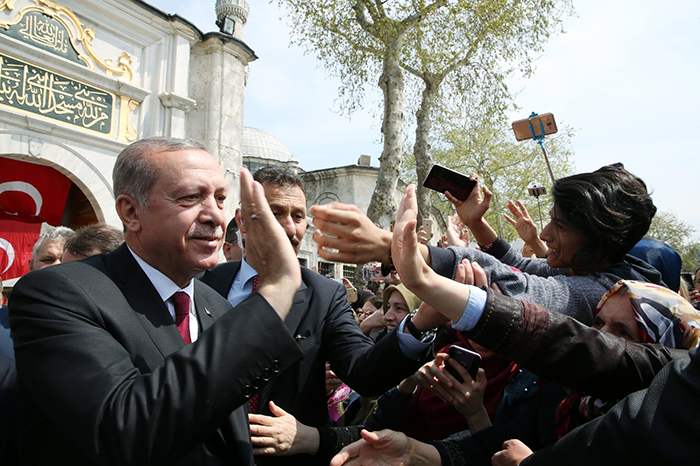



 Mehmet Gul
Mehmet GulFailed coup becomes pretext for absolute rule as referendum deepens Turkey’s divisions.
Without waiting for all the votes to be counted in the April 16 referendum, Turkish President Recep Tayyip Erdogan declared victory. “My nation stood upright and undivided,” he said. The referendum was held to allow for a new constitution that would give the president sweeping new powers. “April 16th was a victory for all of Turkey,” he declared triumphantly.
When the votes were tallied, it was far from the resounding victory Erdogan had hoped for. He squeaked through with barely 51.4% of the vote amid opponents’ charges of large-scale irregularities. Instead of leading a united country, the referendum has only sharpened divisions. If 25 million people voted “Yes” in support of the constitutional changes, 24 million voted “No.” Turkey’s divisions were laid bare in very stark terms.
Sadi Guven, head of the High Electoral Board, the body overseeing the referendum, said the vote was “valid.” The main opposition party, the Republican People’s Party (CHP), however, was not convinced citing irregularities, including the use of unstamped ballot papers. It challenged at least 60% of the ballots and demanded a recount. Reflective of the polarized mood, there were both celebrations and protests following the referendum result. Three major cities — Istanbul, Ankara, and Izmir — voted against the proposed changes. While urbanites alone should not determine the fate of a country, the fact that major cities opposed the changes will prove problematic in the future. Erdogan’s critics lost no time in declaring that Turkey was now effectively under tek adam rule — one-man rule.
Even the 50.4% approval vote was obtained under very dubious circumstances. In the wake of the July 2016 failed coup attempt, Erdogan launched a campaign of large-scale arrests. The coup was blamed on Fethullah Gulen, an exiled preacher, and his supporters. Gulen resides in the US and has close connections with the Zionists and the CIA. While the allegations against Gulen appear to be true, Erdogan himself is not above shady connections with the Zionists.
The arrests, totaling some 100,000 people, go well beyond members of the Gulenist cult. In addition to army and police officers, judges, professors, teachers, and bureaucrats have also been arrested. A large number of journalists who dared question the regime’s heavy-handed tactics are also in jail.
Using the failed coup attempt as pretext, Erdogan declared a state of emergency and then went after his political opponents, especially leaders and members of the Peoples’ Democratic Party (HDP) — a Kurdish and leftist alliance. In the June 2015 parliamentary elections, the HDP won more than 10% of the popular vote thereby giving it 82 seats in the 550-member parliament. The ruling Justice and Development Party’s (AKP) majority was drastically reduced. Erdogan, who had by then moved to the presidency, saw this as a major setback for his ambition to secure a two-thirds majority to usher in the constitutional changes that would give him (the president) almost absolute powers.
In the months that followed the June 2015 parliamentary elections, Erdogan and his party engineered a political crisis forcing another election in November 2015 whereby the HDP was denied any seats in parliament. The peace agreement that Erdogan had signed with the Kurds in 2012, was tossed out and the military was again unleashed in Turkey’s southeast, the predominantly Kurdish region. Erdogan used the bogey of the Kurdish separatist threat to frighten Turkish voters into his camp. He was successful in this but the AKP and its rightwing ally, the Nationalist Movement Party (MHP), again failed to garner the requisite two-thirds majority in parliament.

Following the July 2016 failed coup attempt — seen as a Godsend by the AKP — Erdogan launched a campaign of vilification accusing the predominantly Kurdish party, the HDP, of having links with the Kurdistan Workers’ Party (PKK) and, therefore, terrorism. The army was unleashed on the Kurdish population resulting in the displacement of some 200,000 people. Diyarbakir, the main Kurdish city, looks like a ghost town with bombed-out neighborhoods.
Erdogan’s scorched-earth policy against the Kurds was also intended to provide him the pretext to go after leaders of the HDP. The party’s two top leaders — Selahattin Demirtaş and Figen Yüksekdağ— are facing hundreds of years in prison.
The referendum campaign was launched against the backdrop of these repressive measures. Opponents of the constitutional changes — the “No” camp — were often denied the opportunity to present their case to the public. The ruling party used the media to project opponents of the vote as anti-state elements, members of the Gulenist cult and/or terrorists. Even with such repressive measures, the “Yes” camp could garner only 50.4% of the vote.
While new presidential and parliamentary elections are not due until November 2019, Erdogan and the AKP do not plan to wait until then to bring about the constitutional changes. Deputy Prime Minister Nurettin Canikli said the legal changes to introduce the new system could be completed within a year.
The proposed changes to the constitution that has been in place since 1982 include the following:
1. The president will become all-powerful with all executive au-thority in his hands; currently, it is largely a ceremonial post;
2. The post of prime minister will disappear;
3. The president will serve a five-year term and can remain in office for two terms at most;
4. Parliament will be considerably weakened and its oversight virtually abolished;
5. The president will directly ap-point top public officials, including ministers and one or several vice-presidents;
6. The president will be given the power to intervene in the judiciary, appointing or dismissing judges; and
7. The president will also have the authority to impose a state of emergency.
Opponents of these changes point to the fact that even without such powers, Erdogan has imposed draconian measures and imprisoned thousands of people. When he assumes these powers “legally,” he will become an absolute dictator. Given his conduct so far, these fears are not entirely unjustified.
